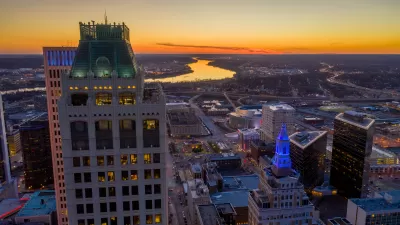Thousands of remote workers moved to Tulsa to take advantage of a $10,000 incentive program. The vast majority of them stayed.

An incentive program that offers remote workers $10,000 to move to Tulsa, Oklahoma is proving remarkably successful as new residents build community and grow to love their new home.
In a piece on Vox, Rani Molla describes how the Tulsa Remote initiative has transformed the city. “The latest Tulsa Remote economic impact report, which the organization conducted itself, found that in 2022, full-year Tulsa Remote members each generated $150,000 in labor income, which includes their salaries plus the estimated income Tulsans got based on their spending. That’s more than 10 times what the George Kaiser Family Foundation, which funds Tulsa Remote and a lot of the city’s other programs and public works, paid out to bring them there.” That’s not including an estimated $2.5 million in added sales tax revenue for the county.
For potential new residents, the money isn’t Tulsa Remote’s only draw: “The program also offered a place where they could find relatively affordable housing, access to free coworking space, and the subsidized opportunity to reimagine their lives anew somewhere else.”
Molla describes the program’s success and the resurgence of many Tulsa neighborhoods, but adds that conservative policies pose a barrier to many young people moving to Oklahoma. Over 2,400 people have participated so far. “Impressively, 90 percent have remained in Tulsa beyond the requisite one-year commitment, and 76 percent of all members have been there since the program launched. People are buying homes, starting families, and getting involved in the community.”
For Tulsa, the key to sustained success will be finding “a way to retain what makes it special while adapting to a new future” by protecting affordable housing and the other amenities that drew people there in the first place.
FULL STORY: Tulsa will pay you to live there. And you’ll love it.

Planetizen Federal Action Tracker
A weekly monitor of how Trump’s orders and actions are impacting planners and planning in America.

Chicago’s Ghost Rails
Just beneath the surface of the modern city lie the remnants of its expansive early 20th-century streetcar system.

San Antonio and Austin are Fusing Into one Massive Megaregion
The region spanning the two central Texas cities is growing fast, posing challenges for local infrastructure and water supplies.

Since Zion's Shuttles Went Electric “The Smog is Gone”
Visitors to Zion National Park can enjoy the canyon via the nation’s first fully electric park shuttle system.

Trump Distributing DOT Safety Funds at 1/10 Rate of Biden
Funds for Safe Streets and other transportation safety and equity programs are being held up by administrative reviews and conflicts with the Trump administration’s priorities.

German Cities Subsidize Taxis for Women Amid Wave of Violence
Free or low-cost taxi rides can help women navigate cities more safely, but critics say the programs don't address the root causes of violence against women.
Urban Design for Planners 1: Software Tools
This six-course series explores essential urban design concepts using open source software and equips planners with the tools they need to participate fully in the urban design process.
Planning for Universal Design
Learn the tools for implementing Universal Design in planning regulations.
planning NEXT
Appalachian Highlands Housing Partners
Mpact (founded as Rail~Volution)
City of Camden Redevelopment Agency
City of Astoria
City of Portland
City of Laramie





























